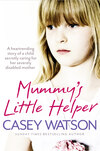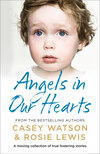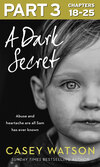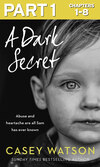Kitabı oku: «Mummy’s Little Helper», sayfa 2
My hunch had been right. No sooner had Abigail seen it than she’d grabbed hold of it gratefully and, finally being persuaded to take off the backpack, she let me lead her from the room. It was if she’d been drowning and was desperate for a life-belt to cling on to; an escape from the turbulent waters of this surreal situation that she had suddenly, inexplicably found herself in.
I led her through the living room and pulled open the French doors that looked out onto the garden. ‘How about that, then?’ I asked her.
I watched her gaze go exactly where I’d imagined it would – to the enormous trampoline in the far corner. It had been something we’d inherited – literally – as we’d been told the previous tenants, who’d gone abroad, had had no time to dismantle it and sell it. So they’d simply left it for whoever moved into the house next, much to Levi and Jackson’s delight. ‘It’s a big one, isn’t it?’ I added, smiling down at Abby now.
She dutifully smiled back and stepped outside with me into the garden. ‘You know, I have two little grandsons, Abigail. There’s Levi, who’s three, and baby Jackson, who’s nearly one. If you like, when they come to play you could show them how to bounce on it.’
Abigail, who was still clutching my hand, looked thoughtful. ‘Yes, I’d like that,’ she said, sounding almost painfully solemn. ‘But Mrs Watson? I think you need to put a net around it first. I’ve seen them on TV and you need those for very little people.’
Bless her, I thought, touched by her serious tone. ‘You know what?’ I said. ‘You’re right. And I never thought about that, love. I’ll have to mention it to Mike, won’t I? Good point. By the way, do you prefer to be called Abigail or Abby?’
Again, she seemed to need to think carefully before answering. ‘Well, my mummy calls me Abby, so I think I’d prefer that. Though my teachers call me Abigail, so I don’t suppose it matters. Whichever you want, really.’
She looked up at me, managed to find another half-smile from somewhere. ‘No contest, then,’ I said. ‘Abby it is.’
She didn’t seem to know what to do or say then, and seemed content to let me lead her on a short tour of the garden, while I did the bulk of the talking. Now clearly wasn’t the time to expect her to open up to me. She’d probably been bombarded with questions from the minute she’d been fetched from school and taken to the hospital. And I didn’t doubt her mind was very much still back there, with her poor mum. My heart went out to her. She must have felt as if she’d been abducted by aliens, which, in a practical sense, she sort of had. What I imagined she most needed was a distraction from the clamour of her fearful thoughts. ‘So,’ I told her, ‘I’m called Casey, okay? No “Mrs Watson”. And Mike, that great big man you just met in there? Well, he’s my husband. And what we do is look after children who, for whatever reason, can’t stay in their own homes for a bit. Did John explain all that to you? Why you’re here?’
Abigail nodded. It was growing dark now and I led us across to the bench seat on the patio. It was cold, but not wet, as it was partly sheltered by a fibre-glass lean-to. It was the only disappointment; a poor second to the wonderful conservatory we’d had in the last house. But it was functional, at least. And also temporary. Mike didn’t know it, but I fully intended to wait a few months, and then badger him mercilessly about getting us a new one. I patted the space beside me on the bench, and she obediently sat down, finally letting go of my hand.
‘So that’s what we’re going to do,’ I went on. ‘Take care of you. So you mustn’t worry about anything, okay? And the first thing we’re going to do is get things sorted so we can get you back to visit your mum as soon as possible –’
‘Tonight?’ she asked timidly. ‘I really need to make sure she’s okay.’
I shook my head. ‘Not tonight, I don’t think,’ I said gently. ‘But definitely this week. If not tomorrow, the next day. After school. We’ll make sure of that, don’t worry. We’ll fix it up with John and Bridget, before they go. And Mummy’ll be fine, you know. She’s in a safe place, and they’ll take really good care of her, just like we’re going to take really good care of you. Now then, how about that hot chocolate and a biscuit? They’ll be wondering where we’ve got to out here, won’t they? Hmm?’
I turned now, to look at her properly. The outside light had already picked out a shiny trail on her face, which marked where tears were slipping silently down her cheeks. The instinctive thing to do, as had been the case with holding out a hand to her, was to pull her towards me and hug her. It was as natural to me as breathing, as it would be to anyone. But with kids in care – particularly the long-term emotionally damaged kids we mostly dealt with – often that’s the last thing they need or want. Starved of normal human relationships, or, sometimes, all too familiar with dangerously inappropriate ones, they can find it almost impossible to empathise or be physical with the very people who most want to help them. But this was not that; this was a normal and clearly much-cherished little girl, who wanted nothing more keenly to be back with the mum who loved her. I scooped her into my arms and she sobbed hard against my chest, and as she did so I reflected that some good might come of this. Fingers crossed, they would soon sort out something workable for her mum’s care and, that done, she’d be able to enjoy at least some semblance of normality for what still remained of her childhood.
I had no reason to expect things to be otherwise at that point. Silly me. Is life ever that simple?
Chapter 3
Abby seemed much better for a cry and a cuddle, and when we returned to the dining room she had got herself composed again, and settled down to a biscuit and her by now lukewarm hot chocolate, which she wouldn’t let Mike pop into the microwave for her. ‘It’s safer to drink it like this, anyway,’ she said quietly, before wrapping both her hands around the mug.
‘So,’ said John, once he’d confirmed details of the hospital visit and reassured Abby that she’d soon be able to see her mum again. ‘I think we’re about done here. And I expect this little lady needs to get to bed, eh?’ He looked at Abby, who was staring into her now empty mug as if it might hold the answer to how she had come to be here. She looked up at him, as if the word ‘bed’ was physically painful. All she wanted, I felt sure, was her own bed.
Mike and I exchanged glances while Bridget said her goodbyes. The mood was sombre now, Bridget having outlined, albeit in the gentlest of tones, that for the moment, at least, Abby would only be able to visit her mum a couple of times a week. Though I understood why – daily visits would be both impractical (the hospital was some distance away) and could potentially slow down the process of adjustment – I really felt for her. This was the mum she had seen every single day for her entire life. No wonder she looked so distraught.
And to really hammer home the drastic and abrupt nature of this disaster, here she was, being deposited with us – a pair of strangers. We were used to this, of course – this business of children who hardly knew us being delivered to our doorstep – but we really were strangers to Abby. No preliminary visits, no chance to get used to the idea; I kept reminding myself that she’d first clapped eyes on us less than an hour ago. I also tried to keep in mind that in the Second World War this was something that hundreds of thousands of kids had gone through, my own and Mike’s parents included. But that was a lifetime away, and knowing it would be of absolutely no comfort to this traumatised child. I stood up again and went round to her side of the table. ‘I thought we might have a little sit-down together before bed,’ I said, placing my hands on her shoulders and dipping my head close to hers. ‘Once we’ve shown you your bedroom and you’ve unpacked and we’ve had our tea, of course. And a rummage through my special bits and bobs box, as well. I had this idea. I thought it might be an idea to get a bit of a diary started. Even a scrapbook, perhaps, that we can stick pictures and special things into. So you can keep mummy up to date with what you get up to while you’re here. Would that be an idea? I bet she’d like that, don’t you?’
I could once more see the white of Abby’s knuckles as she held on to the mug. She was close to tears again, I noticed, now John and Bridget were leaving. For all that there hadn’t been time for them to forge a bond yet, Bridget’s was obviously still the most familiar face in the room.
And Bridget could clearly see that herself. She wasn’t stupid; she knew that to gush at Abby now would create a chink in her fragile composure. Like every social worker, I imagined she’d had her fair share of situations where a desperate child had clung on to her for grim death. ‘Splendid!’ she declared briskly, as she shrugged on her jacket and slid her slim sheaf of papers back into their slip-case. ‘And when I’m back –’ She glanced at me now. ‘Which will be in – let me see now … two weeks – you can show me all the things you’ve been up to with Mike and Casey, hmm? All the adventures you’ve been having with them. Yes?’
Poor Bridget. Abby looked positively mortified by this. As well she might have. She’d already had so much ‘adventure’ in this one day that I felt sure the principal thought going through her mind right then was that even one more adventure would be one too many.
Abby had come to us with a small, carefully packed suitcase, which would have been collected from home after she’d been picked up from school by the on-duty social worker. By this time they would already have put the wheels in motion, so that John could sort an emergency placement, i.e. us. It was a well-oiled machine, social services, in this regard, but for Abby it must have been terrifying.
I sat on the bed and watched as she carefully began taking out the contents, having opened the dresser drawers ready. The case was full. It contained another set of school uniform, a small pile of neatly folded clothes, plus pyjamas, socks and pants, a pink toothbrush and a doll. As she went methodically through the contents, I wondered who’d packed it, then rolled my eyes at my own stupidity. She would have done it; who else? She was used to doing everything for herself, wasn’t she? I made a point of not fussing too much about helping her put things away; she seemed to have a very set way of doing everything, and I could see she was also double checking everything as she did it: she put socks in a drawer, closed it, then opened it again to check, and only then moved on to the next task, which she’d do similarly. It was odd, but I decided to let her get on with it; interfering would probably only make her more anxious than she already was.
‘That’s a pretty doll,’ I said instead, as she took out the last couple of items, which were an equally carefully packed set of doll’s clothes. The doll herself – which was a large one, with long blonde wavy hair, much like her own – was currently dressed as a mermaid. The other outfits, I could see, were also mermaid ones, and quite elaborate; one was decorated with tiny pink feathers, and the other, blue sequins. The doll was clearly much loved, and taken very good care of – a world away from the scant possessions most of our foster kids arrived with. Abby propped her against the pillows and smoothed her hair.
‘She’s called Ariel,’ she told me. ‘Aren’t you, Ariel?’
‘Well, hello, Ariel,’ I said. ‘Very pleased to meet you. But, gosh, look at the time. It’s getting late, isn’t it?’ I stood up to draw the pink-and-purple butterfly-print curtains and flick the switch on the matching bedside lamp. They’d been a real find on eBay – my latest stuff-procurement hobby – and a great asset to my foster-bedroom decorating plans. The room looked cosy and welcoming, at least. ‘Way past teatime, in fact,’ I added. ‘Mike’ll be starving. Are you hungry?’
Poor Mike would, too, I thought, wondering if he was rummaging in the kitchen cupboards as I spoke. I’d left him downstairs washing up the cups and saucers. But Abby shook her head. ‘Not even a little,’ she said. ‘We had some food at the hospital. I don’t really feel like eating anything else, if that’s okay.’
‘Of course,’ I reassured her, remembering the hot chocolate. She’d left the biscuit, but a mug of milky chocolate was pretty filling in itself. And it was gone seven now. I could always make her a sandwich later, if she wanted one. I said so. ‘Here, let’s have that,’ I added, gesturing to the now empty suitcase. ‘I’ll pop it on the top of the wardrobe for you.’
‘But will they make tea for Mummy?’ she wanted to know, as she placed her pyjamas on the pillow beside the doll and carefully smoothed the duvet cover where the case had rucked it up.
‘What, the hospital? Of course they will.’
‘They won’t forget about her, will they?’
I shook my head. ‘Why would they forget about her?’
Abby didn’t look convinced. ‘If she’s sleeping, they might. She needs her sleep. And if she’s asleep they might forget her, mightn’t they?’ She was nibbling the skin around her fingers and talking through them, and I had to stop myself from automatically reaching across and gently pulling her hands from her mouth. Instead, I filed it away for a conversation to have another day. As a child Kieron had always been a great one for nibbling his fingers, and occasionally still did it even now. And with his Asperger’s, it was also one of the signs we would look out for. An intense bout of whittling his fingernails to the quick was a sure sign that, even if outwardly he seemed to be coping, inside he most definitely was not.
‘Sweetheart,’ I told Abby, ‘you absolutely mustn’t worry. They have a system in hospitals, about food and when they bring it, and if a patient is sleeping they always make a note to come back and offer them something later on.’
‘But what if they don’t? I mean, they might not. They might forget. They have so many patients to look after.’
‘They won’t forget,’ I said. ‘Promise. They check every patient regularly. There will be a nurse nearby every single hour of every day.’ I pulled the bedroom door open wider. ‘Now, then, how about we go down and get that box out, and see what we’ve got? I was thinking that perhaps we could go on the internet and find some pictures to print out. You could have the cast of Glee on the cover of it, perhaps. Something like that.’
Abby nodded, seemingly mollified, and produced a small smile which I hope betrayed at least a spark of enthusiasm. ‘Okay,’ she said, as I turned to lead the way back downstairs.
Before following me, however, she crossed the bedroom and carefully turned off the bedside lamp, then reached up and flipped the switch for the main light, as well. And then, as we crossed it, she turned off the landing light too. Then on again, as if undecided, and then off again. ‘Oh, don’t worry,’ I began as we were plunged back into near blackness. ‘We usually leave that one till we’ve gone up to bed.’
She turned to face me, her expression one of complete consternation.
‘But what about the bills?’ she asked incredulously.
It seemed that bills, and the worry of them, not to mention that of timetables for everything from laundry to medication, were what took up most of this small girl’s time. After we’d spent a focused half-hour gathering the raw materials for her new scrapbook, I suggested she go up and change into her pyjamas and that we could then watch some TV before she went to bed. We’d abandoned hope of having our usual meal and Mike contented himself with a couple of extra biscuits, the plan being, since Abby still had no interest in dinner, that we’d order in a take-away to eat once she’d gone to bed. It wasn’t the usual thing we’d do on a random Tuesday evening, but this, of course, wasn’t a usual sort of day.
She’d come back down now and we’d tried to find out a little more about her. There was no point in setting up a tailored behaviour modification programme till we had more idea both about the small person for whom we’d tailor it and the behaviours which most needed modifying.
And it soon became clear – just as John had warned us – that whatever behaviours were worrying social services, they were the result of a life dominated by caring for her mother.
‘So what sort of things do you and your friends like doing?’ Mike asked her, as we settled in the living room. Abby had gone straight to the big new recliner armchair by the fireplace. It had been a moving-in extravagance, and was already Mike’s favourite – but tonight he’d had to come and join me on the sofa. Not that he didn’t often, but I smiled even so. After a long day at the warehouse he liked nothing better than to press the button that made the footrest pop out, and more often than not declare, ‘Fit for a king, this!’
But I knew he didn’t mind, bless him. There was a David Attenborough wildlife programme coming on shortly, which we’d both been keen to see, and which Abby had expressed interest in watching too. Her mum, she explained, had really liked the series about the sea – when ‘she could still actually see the telly,’ she’d added sadly.
She turned to Mike now. ‘I don’t really have many friends,’ she told him, one hand twiddling a few strands of her hair round and round. ‘I don’t have much time for things like that.’
Mike raised his eyebrows. ‘What, none?’ he asked, mock-incredulously. ‘Not even one special best friend for ever? A BFF – isn’t that what they call them these days?’
Abby shook her head. ‘Not really,’ she repeated, with a shrug. I watched her carefully, but she didn’t seem to be distressed making this admission – simply stating a fact. ‘I don’t need friends anyway,’ she added quietly. ‘I have Mummy.’
‘And a very busy life, by the sound of it,’ I said quickly, anxious that she didn’t get upset again. Which she clearly was. She was twiddling her hair even faster, though she didn’t seem conscious of the fact. ‘Oh, and look, the programme’s starting,’ I said, glad of a distraction for the poor child. ‘We’ve been looking forward to seeing this all week.’
And it was good, too, except I kept getting distracted by Abby who, though her eyes were on the television, seemed in some sort of trance, and continued to play constantly with her hair. As I kept glancing at her, I realised she was no longer playing with a lock of hair, but with single strands, which she’d carefully separate out, using both hands, then wind around her index finger, as you might roll cotton around a pencil, then, with a tiny jerk, pull from her head.
Again and again this would happen – it was almost ceaseless. She’d get hold of a strand of hair, spool it slowly up, then – tug – she’d have freed it, whereupon she’d uncoil it and then let it spring free from her finger. Even at a distance of several feet across the room, I could see a tiny nest of hairs growing on the chair arm. And even with the experience of many deeply distressed children, I could see I was dealing with something different here. John had alluded to ‘behaviours’, but this was new territory. I would definitely have to read up on what we might potentially be dealing with. And definitely not forget about that sandwich.
Chapter 4
John called at nine, as he’d promised he would the night before, for an update on how things had gone. But it was John, not me, who had the most to say in terms of updating, having just returned to his office from a further trip to Abby’s home.
In the next few days, assuming Abby’s mum remained in hospital, she’d be allocated to a health-care team, who’d take charge of things at home for her, but as a stop-gap it had fallen to Bridget. So John had gone and met her there first thing. Abby’s mum, who was apparently called Sarah, had been anxious about the place being empty, and had requested that she go back to check things, make sure the heating had been set to low, and that the windows were all locked, as well as to collect a list of further items for Abby – school books and footwear and her winter coat and so on – none of which, in the rush, she’d had time to take with her, and about which both mother and daughter had been fretting.
‘So it made sense for me to take them,’ John explained. ‘Since I’d be the next one stopping by at yours. So I’ll bring them up when I come to you next week. And I am so glad I did go, I can tell you, because it’s given me a really useful insight. Just incredible. You’d have to see it to believe it, trust me. It’s told us volumes in terms of how these two have been living. It’s no wonder they were under the radar. Honestly, Casey, if an alien came to earth on a reconnaissance mission, they’d have everything they needed in that one house alone. There is an instruction for absolutely everything. Anyway, first up, how has Abby been overnight? Okay?’
I told him about the hair pulling, and that it was something I’d keep an eye on, but reassured him that, all things considered, she’d been fine. She’d been fast asleep the couple of times I’d gone in and checked on her, and had woken looking marginally less traumatised at least. Though not for long – not once she’d remembered about school.
A taxi had been organised the day before, to take her, and had arrived promptly at eight, its exhaust billowing white in the cold air. It had struck me as a little odd that she’d be going to school at all, but, as Bridget had pointed out, it was important that Abby had at least some normality to cling on to. Besides, it was a special day – it was Abby’s class assembly, which was as good a reason as any not to miss it.
But, despite apparently accepting this at the hospital the day before, she’d been upset by its arrival, when the reality of actually going to school sunk in. Not because she was anxious about being there, particularly, but because she was so anxious about her mother’s welfare. ‘But what about Mummy’s breakfast?’ she’d asked me, her chin wobbling, as I’d tried to coax her into eating some of her own. I’d gently reminded her that the nurses would have seen to it she had breakfast. ‘But what if they don’t?’ she persisted. ‘Or what if they don’t know what she likes?’
I’d sat down and explained about the little menu cards for meals they had in hospitals and how patients could tick boxes to say what they wanted, be it porridge, Weetabix or toast and marmalade and so on. But this just threw up another whole set of problems. ‘But she won’t be able to read it. Will they realise that?’ she asked plaintively. ‘Will they just think she can and then get cross when she hasn’t ticked things?’
I told her no, they certainly wouldn’t get cross about anything. And that they knew about her mum’s MS and how reading was a bit difficult, and reassured her that someone would go through the list with her. Which, along with my promise to ring the hospital while she was at school, seemed to settle her enough for her to sit at the kitchen table, at least.
‘But then there were the bins,’ I explained to John now.
‘The bins?’ he asked. ‘What bins?’
‘The bins at her house. Wednesday is dustbin day where they live, apparently. And she was really worried about who would take the bins out for them.’
‘Ah,’ John said. ‘Well, you can certainly reassure her on that point. We’ve seen the next-door neighbours – the ones on the right, anyway. The house the other side is currently empty – and they’ve given us a number, in case we need to get in touch with them. I’m hoping that when we next have contact with Sarah we’ll be able to persuade her to give them a key as well. I’ll ring them if you like; ask them to deal with the bins. That way you can at least put the poor girl’s mind at rest.’
‘That would be good, John. Because you know what she did, before she left for school?’
‘Tell me.’
‘She was just about to get into the taxi when she turned around and ran back – I actually thought she’d decided she wasn’t going at this point, of course – but, no. She grabbed our wheelie bin and dragged it to the pavement.’
‘Your wheelie bin? Why would she put out your wheelie bin?’
‘I know. And I’d already told her it wasn’t our bin day. But then I realised she probably just had to do it, didn’t she? She just couldn’t bear to get in that taxi without doing it. Would probably have fretted about it all day.’
‘Bless her,’ said John. ‘That’s exactly the kind of thing we thought might be a problem. And it’s no surprise, frankly, given what Bridget and I have seen this morning. Really brings it home to you how things have been for the poor girl.’
John went on to describe what he’d found at the family home, which was as much of an eye-opener as he’d promised. The whole house, he explained, had been totally modified for a young child to do absolutely everything. There were sticky notes everywhere – some recent, some old and yellowing – on which were hand-written instructions for doing just about everything you could think of. How to operate the washing machine, how to set the timer and the thermostats for the heating and hot water, how to operate the cooker, the microwave and the grill. There were notes on what temperature setting to use for the fridge – summer and winter – and an inventory of the contents of all the drawers and the cupboards, including crockery and cutlery, pots, pans and bakeware, glasses and mugs, housewares and food. The kitchen also contained evidence of just how much routine there was here. There was a big wall chart, detailing what meals would be eaten and when, and a ring binder, chock full of simple recipes, many of which had been painstakingly written out in a child’s handwriting, while others had been torn from magazines.
Abigail also had her own little dedicated cleaning cupboard, where on the inside of the door was written a long list of chores and when to do them: polish wooden furniture and banisters Mondays, bleach in toilet daily, white wash on Thursday, and so on. The house was also liberally strewn with small coloured plastic steps, some of the type you’d use when toilet training a toddler, others larger – including one four-foot stepladder, even – to provide access to high-mounted cupboards.
‘Everything you could think of,’ John finished. ‘Simply everything. Right down to a light-bulb inventory and book of money-off coupons – all in sections – one for each supermarket nearby. If it needs organising, basically, it’s been organised into the ground. Never seen anything quite like it in my life. I suspect there’s not been a minute of a single day that doesn’t – well, didn’t – come with its own list of jobs. Boot camp. That’s the word. It’s just like boot camp. Quite remarkable.’
‘What was the mother thinking?’ I wondered, trying to put myself in her shoes. ‘Why on earth didn’t she get them some help?’
‘Exactly,’ John said. ‘That’s what Bridget and I were both stumped by. I mean, it’s hardly as if help for these sorts of things isn’t publicised, is it? Couple of clicks of a mouse would have her straight to the MS website, wouldn’t it?’
‘So did Bridget talk to her about that?’
‘A little, she says, though none of it was particularly enlightening. She just said they always managed by themselves, pretty much. Which I can sort of see, I suppose. If you’re fairly isolated, anyway. Because it’s obviously happened gradually – as has the progression of the disease, of course. So I suppose I can see how it’s just become their version of “normal”. And Abby will never have known any different, will she? Though, that said, she must surely have seen the way other families work, mustn’t she? When she’s gone to friends’ houses for tea and so on – something must have clicked.’
‘I’m not sure she’s done a great deal of that sort of thing,’ I told him. ‘According to her, she has no friends. Hasn’t got the time for them.’
‘Well, that does ring true,’ he said, ‘given what we’ve seen this morning. Anyway, we might find out a little more about all that later on today. Bridget wasn’t first on the scene, of course – it was the on-duty social worker … So she’s going to chase that up when whoever it was is back in the office later. See if she can find out any more about what’s been discussed. But it’s certainly odd, isn’t it? To cut yourself off from help in that way. Though right now the most pressing thing is to try to find some family. It seems incredible that there’s absolutely no one who could help.’
‘I’ll obviously see what I can find out from Abby, too,’ I said. ‘Maybe she can throw a bit more light on things.’
‘That would be helpful. Anyway, the main thing right now is for you to make sure she’s okay. From what I’ve seen this morning, it’s no wonder she has anxiety-related issues. Her whole life seems to have been one long to-do list, so some emotional fall-out’s going to be expected, isn’t it? She’s going to find the loss of control hard to adjust to, I’m sure.’
John was right, of course. Abby was dropped home from school and the very first thing she did when I opened the front door to her was to go ‘brrr’, and ask me where the central heating controls were. Mindful of my discussion with John earlier I simply took her upstairs and showed her, as she had such a pinched, anxious look on her face, that it was clear this was something that had been on her mind for a while.
‘Can I have a look?’ she asked me, once we were upstairs and peering into the airing cupboard. The controls were set high on the wall, and it was difficult for her to see them. She was a tiny little thing for her age – a good six inches shorter than Spencer, who’d just left us, even though she was a good year older than him.








